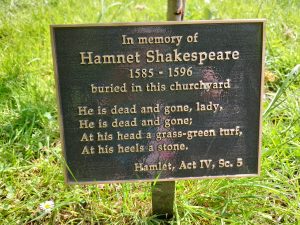Source: RSC programme, 2023
Elizabeth Wolstenholme Elmy worked alongside many women who influenced the direction of women’s rights: it will be such women who will be the focus of future posts. However, this blog is based upon my recent visit to the Royal Shakespeare Company (RSC) in Stratford-upon-Avon. During my visit I saw the play Hamnet, based upon the book of that title by Maggie O’Farrell. Here I draw upon that story to illustrate how three very different women have influenced our culture and literature.
Agnes Shakespeare
Agnes, also known as Anne, was the wife of Shakespeare. In the play, Agnes is a strong woman who resists prejudice, is mother to three lively children and looses her son (Hamnet) to the plague.
How Agnes supported, encouraged and influenced Shakespeare is a key part of the whole story. It was her who had the initial idea for him to move to London and, as they say, the rest is history. The focus of the novel is her story and the sad death of Hamnet.
Maggie O’Farrell
In 2020 Maggie O’Farrell placed Agnes centre stage in her novel, which opens with the following historical note:
‘In the 1580s, a couple living in Henley Street, Stratford, had three children: Susanna, then Hamnet and Judith, who were twins. The boy, Hamnet, died in 1596, aged eleven. Four years or so later, the father wrote a play called Hamlet[1]’.
The book illustrates vividly Agnes’s love for William and shows clearly what an influence she had upon his life and work. The death of Hamnet tore them apart, and William explored his grief by writing Hamlet. In the play we see the strong relationship between Hamnet and his twin, Judith. She caught the plague first and may have passed it to him as he spent hours caring for her as she fought the fever. In the end, sadly, he catches it and dies.
Through her research Maggie O’Farrell found that there are no graves to Hamnet and Judith. Consequently, she engaged with the Church and now there are two rowan trees and plaques in the graveyard in memory of them.

Trees planted 2022 for Judith and Hamnet

Judith’s plaque

Hamnet Shakespeare
Erica Whyman
The play ‘Hamnet’ is Erica Whyman’s last production as the RSC Acting Artistic Director. The production was powerful and imaginative, engaging the audience in the telling of this story. As a woman of influence, Erica brought the play alive and took us on a roller coaster of emotions.
As Erica steps away from the role she has fulfilled so well for the last ten years, two aspects of her work stand out and illustrate her influence.
One of her first tasks was to ensure that The Other Place, briefly transformed into the Courtyard, could remain as a permanent addition to the theatres in Stratford. This was achieved ensuring that The Other Place could continue since its original opening by Buzz Goodbody in 1974. It was Buzz Goodbody’s intention that the space should allow for experimental theatre. Herself an incredibly influential women, she certainly achieved that aim.
At the RSC Erica has actively engaged with many amateur drama groups around the country. They have been provided with training and the opportunity to appear in productions, both in Stratford and on tour. A demonstration of how perceived barriers can be challenged, in the arts and beyond.
More than three women?
Definitely more than three women. In writing this I have mentioned Buzz Goodbody. It is also important to mention Lolita Chakrabarti who adapted the novel for the stage, and all the female members of the RSC team.
It is worth recalling that in 1932 the theatre was burnt down and rebuilt. The architect was a woman, Elisabeth Scott. Over 90 years later many of the features she designed remain to give pleasure not only to those visiting the theatre but to many others as they walk along the river.

By David Stowell, CC BY-SA 2.0, https://commons.wikimedia.org/w/index.php?curid=9128826. The theatre before it was transformed around 2010; to this day it maintains many of these original features.
We each know women of influence and may well be women of influence. Let us celebrate this as the world needs women of influence.
[1] Hamnet and Hamlet are the same name, entirely interchangeable in Stratford records of the time.


Recent Comments